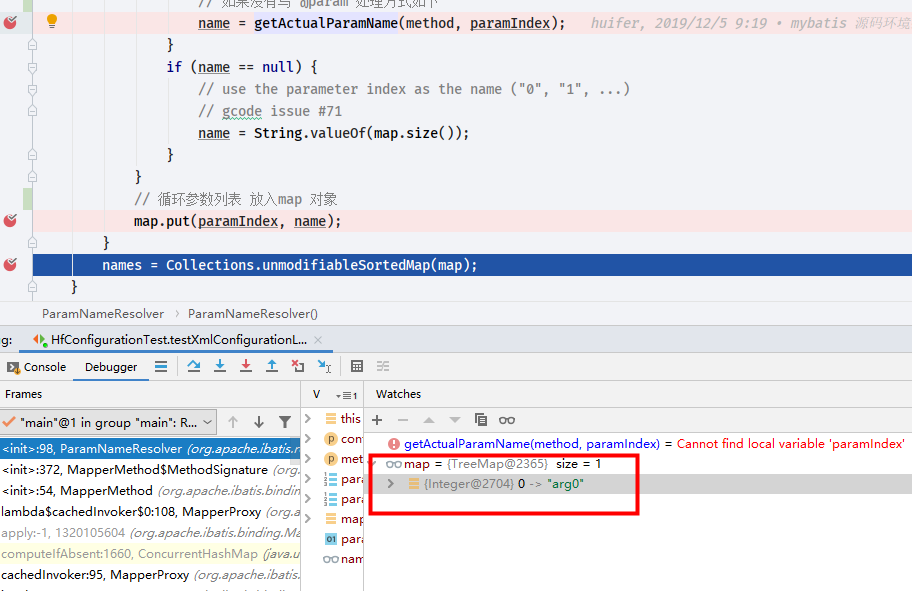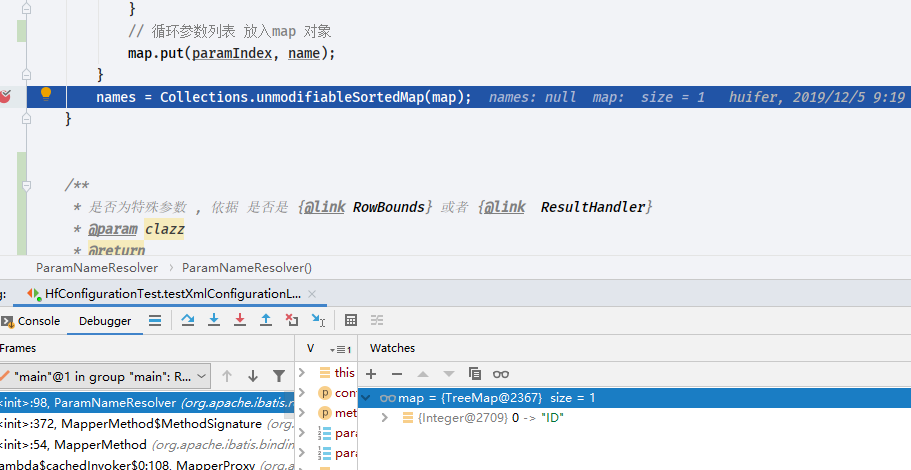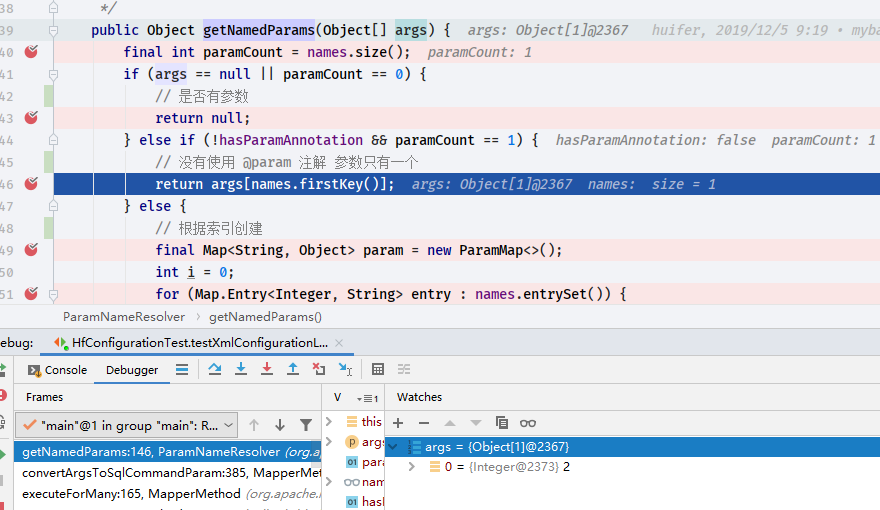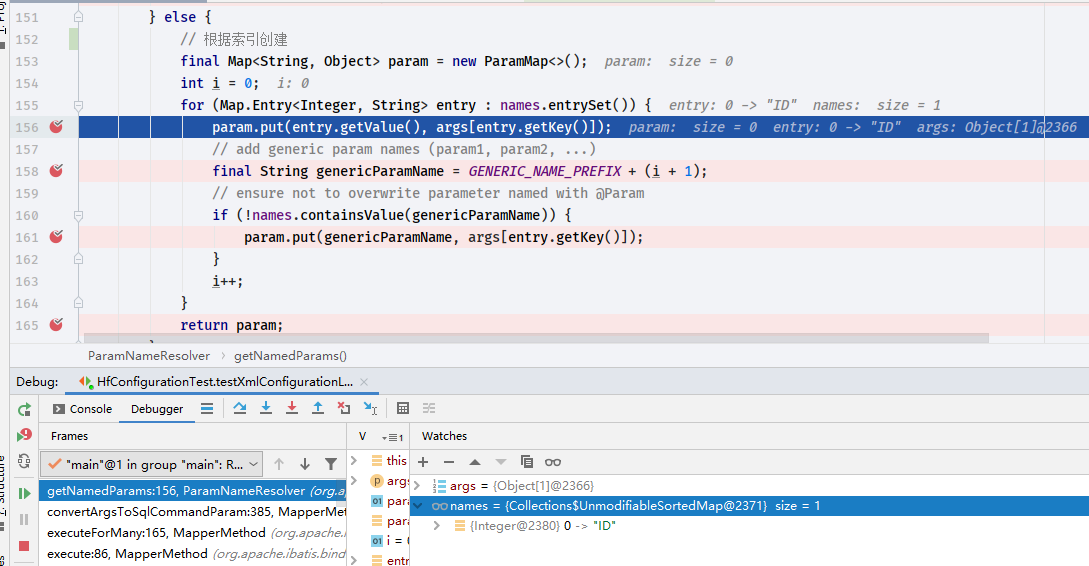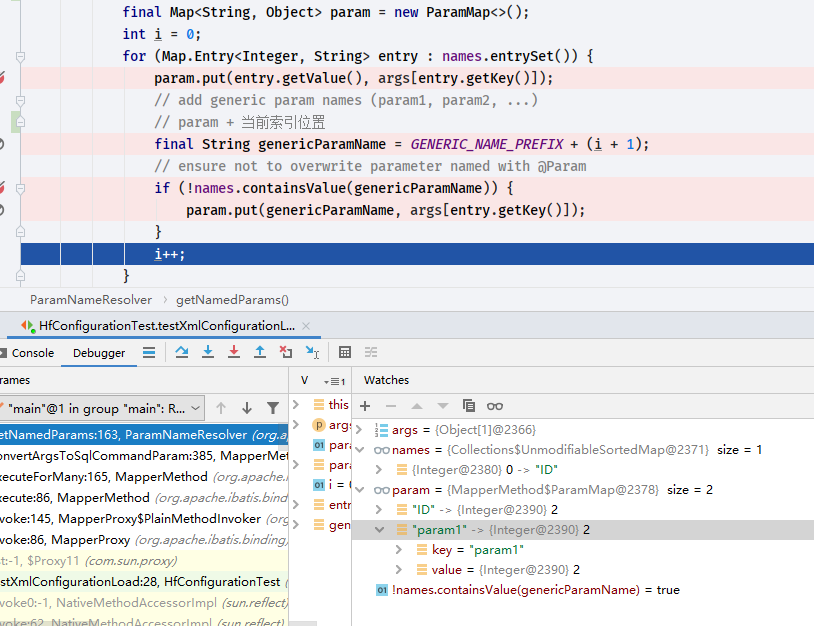1
2
3
4
5
6
7
8
9
10
11
12
13
14
15
16
17
18
19
20
21
22
23
24
25
26
27
28
29
30
31
32
33
34
35
36
37
38
39
40
41
42
43
44
45
46
47
48
49
50
51
52
53
54
55
56
57
58
59
60
61
62
63
64
65
66
67
68
69
70
71
72
73
74
75
76
77
78
79
80
81
82
83
84
85
86
87
88
89
90
91
92
93
94
95
96
97
98
99
100
101
102
103
104
105
106
107
108
109
110
111
112
113
114
115
116
117
118
119
120
121
122
123
124
125
126
127
128
129
130
131
132
133
134
|
/**
* {@link Param} 注解的扫描工具和处理工具
*/
public class ParamNameResolver {
public static final String GENERIC_NAME_PREFIX = "param";
/**
* <p>
* The key is the index and the value is the name of the parameter.<br />
* The name is obtained from {@link Param} if specified. When {@link Param} is not specified,
* the parameter index is used. Note that this index could be different from the actual index
* when the method has special parameters (i.e. {@link RowBounds} or {@link ResultHandler}).
* </p>
*
* {@link ParamNameResolver#ParamNameResolver(org.apache.ibatis.session.Configuration, java.lang.reflect.Method)} 中的map 变量值转换而得
* {参数索引: 参数名称(arg0,Param注解的value)}
*
*/
private final SortedMap<Integer, String> names;
private boolean hasParamAnnotation;
public ParamNameResolver(Configuration config, Method method) {
// 方法参数类型
final Class<?>[] paramTypes = method.getParameterTypes();
// 参数上的注解
final Annotation[][] paramAnnotations = method.getParameterAnnotations();
// 参数索引和参数名称
// {参数索引:参数名称}
final SortedMap<Integer, String> map = new TreeMap<>();
int paramCount = paramAnnotations.length;
// get names from @Param annotations
for (int paramIndex = 0; paramIndex < paramCount; paramIndex++) {
if (isSpecialParameter(paramTypes[paramIndex])) {
// skip special parameters
// 如果是特殊类型跳过
continue;
}
String name = null;
// 注解扫描@Param
for (Annotation annotation : paramAnnotations[paramIndex]) {
// 是否为 Param 注解的下级
if (annotation instanceof Param) {
hasParamAnnotation = true;
// 获取 value 属性值
name = ((Param) annotation).value();
break;
}
}
if (name == null) {
// 如果没有写 @param 处理方式如下
// @Param was not specified.
if (config.isUseActualParamName()) {
name = getActualParamName(method, paramIndex);
}
if (name == null) {
// use the parameter index as the name ("0", "1", ...)
// gcode issue #71
name = String.valueOf(map.size());
}
}
// 循环参数列表 放入map 对象
map.put(paramIndex, name);
}
names = Collections.unmodifiableSortedMap(map);
}
/**
* 是否为特殊参数 , 依据 是否是 {@link RowBounds} 或者 {@link ResultHandler}
* @param clazz
* @return
*/
private static boolean isSpecialParameter(Class<?> clazz) {
return RowBounds.class.isAssignableFrom(clazz) || ResultHandler.class.isAssignableFrom(clazz);
}
/**
* 返回方法名 参数索引
* @param method
* @param paramIndex
* @return
*/
private String getActualParamName(Method method, int paramIndex) {
return ParamNameUtil.getParamNames(method).get(paramIndex);
}
/**
* Returns parameter names referenced by SQL providers.
*/
public String[] getNames() {
return names.values().toArray(new String[0]);
}
/**
* <p>
* A single non-special parameter is returned without a name.
* Multiple parameters are named using the naming rule.
* In addition to the default names, this method also adds the generic names (param1, param2,
* ...).
* </p>
* <p>
* 通常参数异常在这个地方抛出 param ... 异常
* 获取参数名称,和参数传递的真实数据
*/
public Object getNamedParams(Object[] args) {
final int paramCount = names.size();
if (args == null || paramCount == 0) {
// 是否有参数
return null;
} else if (!hasParamAnnotation && paramCount == 1) {
// 没有使用 @param 注解 参数只有一个
return args[names.firstKey()];
} else {
// 根据索引创建
final Map<String, Object> param = new ParamMap<>();
int i = 0;
for (Map.Entry<Integer, String> entry : names.entrySet()) {
param.put(entry.getValue(), args[entry.getKey()]);
// add generic param names (param1, param2, ...)
// param + 当前索引位置
final String genericParamName = GENERIC_NAME_PREFIX + (i + 1);
// ensure not to overwrite parameter named with @Param
if (!names.containsValue(genericParamName)) {
param.put(genericParamName, args[entry.getKey()]);
}
i++;
}
return param;
}
}
}
|
